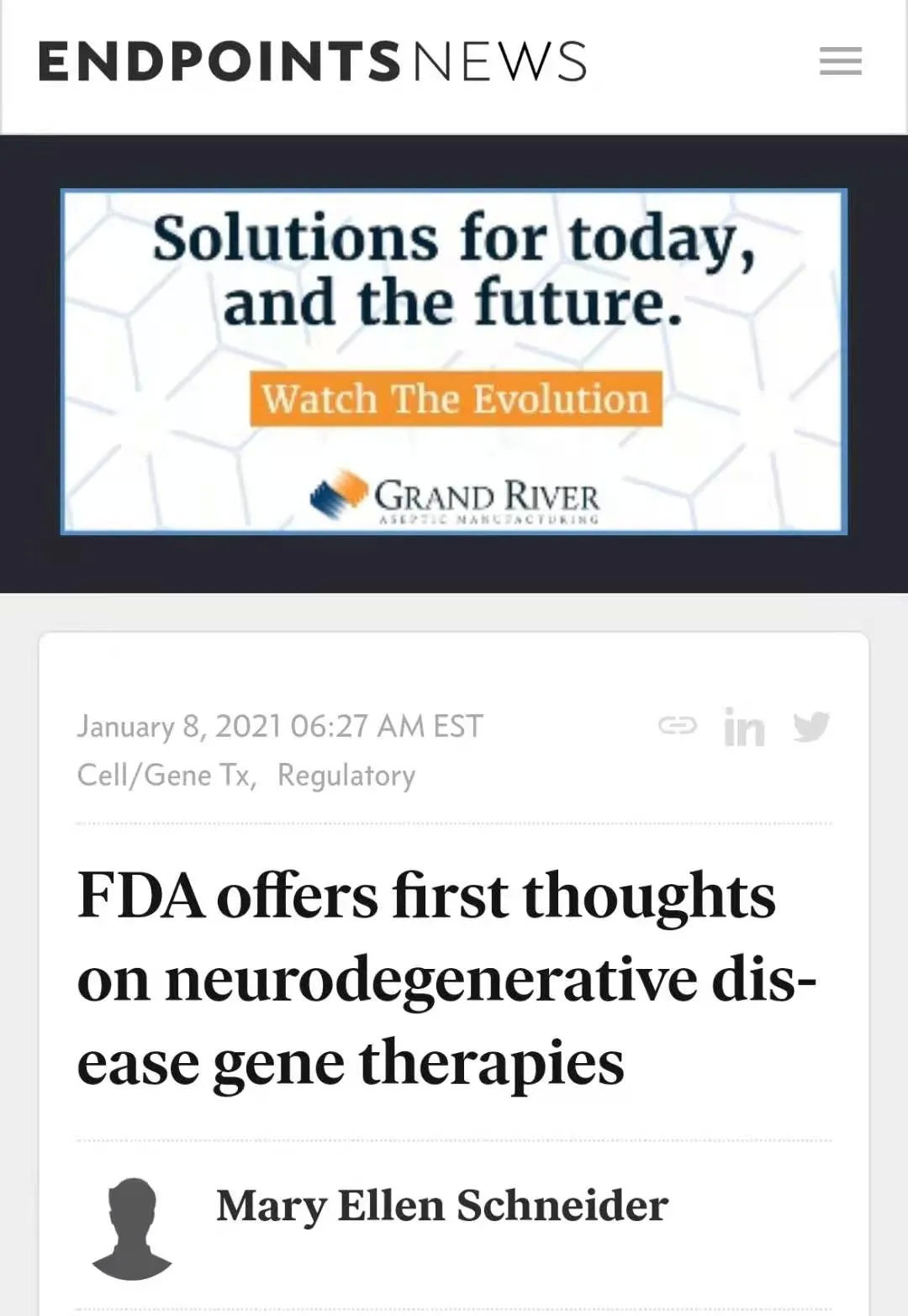24小时服务热线:19103801095
NEWS CENTER
Recommend case
contact us

FDA在上周二发布了神经退行性疾病人类基因疗法开发、测试和试验设计指南草案,草案中对这类新产品的批准途径也作了强调。
该指南草案适用于成人和儿童人群的产品,草案奇亿娱乐调了在提交新药临床(IND)申请前与FDA早期沟通的重要性。FDA指出,INTERACT会议可以用来讨论产品早期临床前计划中的问题,而IND前会议可以在产品开发后期但在提交申请之前进行。
与FDA组织和先进疗法办公室(OTAT)的早期互动,作为生物制剂评价和研究中心的一部分,可能包括与药品纯度、鉴别、效力和剂量评价相关的产品特定考虑。
FDA还建议申办方评估制造工艺变更对产品关键质量属性(CQA)的影响。如果无法立即确定影响,则应考虑进行两部分风险分析,以期前瞻性地观察变更前和变更后的产品,以及追溯分析已保存的变更后产品的样本。
在开展基因治疗产品的临床前研究时,该机构建议重点关注五个总体目标:
1、生物活性剂量范围的鉴别(鉴别、明确);
2、对初始临床剂量水平,剂量递增时间表和给药方案给出的建议;
3、拟议临床给药途径的可行性和合理安全性的确定;
4、患者资格标准的支持;
5、识别潜在的毒性和生理参数以指导临床监测。
在考虑儿科的首次人类临床试验时 “比最小的风险要小得多”,FDA呼吁申办者设计一项临床前计划,其中应包括能够表明该基因疗法可直接受益的研究。FDA写道:“当无法从具有相同疾病的成年受试者获得有效性的临床证据时,支持直接受益前景的临床前证据最为重要。”
FDA建议创新的临床设计(应不仅仅是随机对照试验(RCT)可用于具有明确特征的发病机理和病理生理学的单基因疾病的临床开发,例如由于生存运动突变而导致的婴儿脊髓性肌萎缩神经元1基因。但是,传统的RCT可能更适合于病因了解少,自然病史多变的神经退行性疾病,例如偶发性肌萎缩性侧索硬化症或偶发性阿尔茨奇亿娱乐氏病。
但建议申办者至少应考虑针对任何神经退行性疾病的创新性试验设计—适应性设计、富集设计、剂量对照研究或历史对照。
在计划儿科临床试验时,FDA建议申办者首先获得成人的初步安全性和有效性数据。如果没有以前的成人数据,发起人应提供关于成人研究不合理的理由。
在任何旨在支持市场应用的临床试验中,FDA建议主要功效终点应为具有临床意义的终点或替代终点,才能“合理地”预测临床获益。
具有临床意义的终点通常将用于支持传统批准途径下的市场申请,而替代终点可被用来支持传统的审批途径下上市申请,而替代终点可用于支持加速审批。该机构写道:“当基因治疗产品直接针对潜在的,充分理解的和详细记录的单基因改变而导致严重的神经退行性疾病时,使用替代终点可能是合适的。” “在这些情况下,基因治疗产品可能会改变潜在的遗传缺陷,从而治疗或治愈该疾病。”
英文原文见如下:
FDA offers first thoughts on neurodegenerative disease gene therapies
The FDA has issued draft guidance on the development, testing, and trial design for human gene therapies for neurodegenerative diseases. The document, released on Tuesday, also highlights approval pathways for these novel products.
The draft guidance, which applies to products for both adult and pediatric populations, emphasizes the importance of early communication with FDA before the submission of an investigational new drug (IND) application. The agency pointed to INTERACT meetings, which can be used to discuss issues in a product’s early preclinical program, and pre-IND meetings, which occur later in development but prior to the submission of an application.
Early interaction with FDA’s Office of Tissues and Advanced Therapies (OTAT), part of the Center for Biologics Evaluation and Research, may include product-specific considerations related to the evaluation of drug product purity, identify, potency, and strength.
FDA also recommends that sponsors evaluate the effect of manufacturing process changes on the product’s critical quality attributes (CQAs). In cases where the effect is not immediately identifiable, sponsors should consider conducting a two-part risk analysis prospectively looking at pre- and post-change product, as well as retrospectively analyzing post-change product samples that have been preserved.
When developing preclinical studies for gene therapy products, the agency recommends focusing on five overall objectives:
1、Identification of a biologically active dose range
2、Recommendations for an initial clinical dose level, dose-escalation schedule, and dosing regimen
3、Establishment of feasibility and reasonable safety of the proposed clinical route of administration
4、Support of patient eligibility criteria
5、Identification of potential toxicities and physiologic parameters to guide clinical monitoring
When considering pediatric, first-in-human clinical trials where there is “more than a minor increase over minimal risk,” the agency is calling on sponsors to design a preclinical program that includes studies showing the potential for direct benefit of the gene therapy. “Preclinical evidence to support a prospect of direct benefit is most important when clinical evidence of effectiveness is not available from adult subjects with the same disease,” FDA wrote.
FDA suggested that innovative clinical designs — not only randomized, placebo-controlled trials (RCTs) — could be used for clinical development for monogenic disorders with a well-characterized pathogenesis and pathophysiology, such as infantile spinal muscular atrophy due to mutations in the survival motor neuron 1 gene. However, traditional RCTs are likely more appropriate for neurodegenerative diseases with a poorly understood etiology and a variable natural history, such as sporadic amyotrophic lateral sclerosis or sporadic Alzheimer’s disease.
But sponsors are advised to at least consider innovative trial designs — adaptive designs, enrichment designs, dose-controlled studies, or historical controls — for any neurodegenerative disorder.
When planning pediatric trials, FDA recommends that sponsors first obtain preliminary safety and effectiveness data in adults. If no prior adult data is available, sponsors should provide a rationale as to why adults studies are not ethical or feasible.
In any clinical trials that are intended to support a marketing application, FDA advises that the primary efficacy endpoints should be either clinically meaningful endpoints or surrogate endpoints that are “reasonably likely” to predict a clinical benefit.
An effect on a clinically meaningful endpoint would generally be used to support a marketing application under the traditional approval pathway, while surrogate endpoints could be used to support accelerated approval. “Use of a surrogate endpoint may be appropriate when a [gene therapy] product directly targets an underlying, well-understood and well-documented monogenic change that causes a serious neurodegenerative disorder,” the agency wrote. “In these cases, the [gene therapy] product could alter the underlying genetic defect and thereby treat or cure the disease.”
站点声明:
本网站所提供的信息仅供参考之用,并不代表本网赞同其观点,也不代表本网对其真实性负责。图片版权归原作者所有,如有侵权请联系我们,我们立刻删除。如有关于作品内容、版权或其它问题请于作品发表后的30日内与本站联系,本网将迅速给您回应并做相关处理。
奇亿娱乐(中国)有限公司专注于医疗器械、诊断试剂产品政策与法规规事务服务,提供产品注册申报代理、临床合同(CRO)研究、产品研发、GMP质量辅导等方面的技术外包服务。